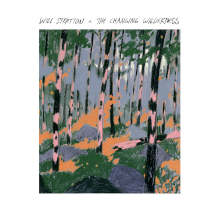The Graham Album Review #2075

Click on CD Cover for Audio Review in streaming mp3 format | |
Will Stratton: The Changing Wilderness
by George Graham
(Independent release broadcast on WVIA-FM 6/30/2021)

Click on CD Cover for Audio Review in streaming mp3 format | |
Will Stratton: The Changing Wilderness
by George Graham
(Independent release broadcast on WVIA-FM 6/30/2021)
The music world counts a number of performers who turned to be much more influential than their initial popularity or commercial success: artists who are considered obscure, but whose biggest fans seem to be other artists, who often show their influence. Perhaps the most iconic of such obscure but influential artists, at least among singer-songwriters, is the late Nick Drake. The English folk artist recorded three albums between 1969 and 1972, creating a highly personal sound that absorbed some British Isles traditional folk, a surprising amount of jazz influence, especially in the complex harmonic structure of his songs, and an unmistakable smoky voice that was at once cerebral and vulnerable. Drake’s records never sold well, and he tragically died at the age of 26 in 1974. But as the years went on, his music was discovered by successive generations of artists and cited by them, including Kate Bush, Duncan Sheik, and Peter Buck of R.E.M. The band the Cure was named after a line from a Drake song, and recently, jazz musicians have increasingly been covering Drake’s songs.
This week we have an admitted acolyte of Nick Drake’s music with a new release. It’s Will Stratton, and his new seventh album is called The Changing Wilderness.
Will Stratton is a native Californian, who grew up in New Jersey, and currently resides in the Upstate New York Hudson River town of Beacon. He released his first album in 2005, shortly after graduating from high school. It featured a guest appearance by another multifaceted artist Sufjan Stephens. Stratton then studied classical musical composition at Bennington College, and has incorporated some of the pieces he composed for class into music on his albums. Most of Stratton’s recordings have not been widely distributed, and he often put out songs for people to download for free. Some of his songs were also distributed through NPR’s music webcasts.
For his new release, Stratton hooked up with an independent record label Bella Union Records, which provided him with somewhat wider distribution and promotion. Thus it was the first opportunity I had to hear his music, 16 years into his recording career and after his successful battle with cancer. And Stratton proves to be a worthy musical offspring of Nick Drake. His songs are often melancholy, but musically interesting, with acoustic guitar and acoustic bass prominent, and vocally there is something of a resemblance. His lyrics are also tend to be poetically vague, though at times, he can get somewhat sharp-tongued.
The group on the album is quite understated, with mostly un-amplified instrumentation, with arrangements that underscore the often contemplative-sounding songs. Probably most prominent besides Stratton’s guitar is Carmen Rothwell’s acoustic bass.
The album leads off with a piece called Tokens with a little of the guitar filigree of the English folk scene, plus a quirky rhythmic structure that adds to the interest. <<>>
Black Hole lays out a rather strong excoriation of someone who is not specified, though one could probably apply it to a certain orange figure in political world. The musical setting makes it interesting. <<>>
A track called Infertile Air seems to tell the story of couple in conflict, while the plot seems rather complicated for such a song. <<>>
One of the pieces most prominently tipping a hat to the style of Nick Drake is The Rain, with its mostly acoustic guitar accompaniment with intricate finger-picking and interesting harmonic structure. <<>>
Fate’s Ghost is another of the album’s most interesting tracks, with a more elaborate arrangement and another set of intriguing lyrics that probably have a story behind them. <<>>
There is one definite love-song on the album called When I've Been Born (I'll Love You) though it’s not without its complications. <<>>
The album closes with another of its highlights, Stillness, with lyrics that seem appropriate for a valedictory.
I’m not the first to observe Will Stratton’s influence by the late Nick Drake. He does tend to wear it on his sleeve, but his new seventh album The Changing Wilderness is hardly a slavish imitation. Some of Drake’s musical elements are incorporated, but Stratton is definitely his own man, with his distinctive lyrical approach, and some of the compositional elements he got from his classical courses at college. The result is a pleasing, thoughtful album that you can really dig into if you want to, with a number of music musical and lyrical layers. The instrumentation is understated and tasteful, highlighting Stratton’s first-rate finger-picking guitar work; and using acoustic bass exclusively also gives the album added warmth.
Our grade for sound quality is about an A-Minus. The mix is usually clean and the acoustic instrumentation well-captured. But the prominent acoustic bass can be a little boomy at times, and occasionally the mix lacks a little clarity. The dynamic range is bit above average.
Will Stratton has created a thoroughly worthwhile album that epitomizes the contemplative-sounding, but musically sophisticated singer-songwriter, a tradition that has been quietly on the edges of the music scene for decades.
(c) Copyright 2021 George D. Graham. All rights reserved.
This review may not be copied to another Web site without written permission.
 To Index of Album Reviews | To George Graham's Home Page. | What's New on This Site.
To Index of Album Reviews | To George Graham's Home Page. | What's New on This Site.